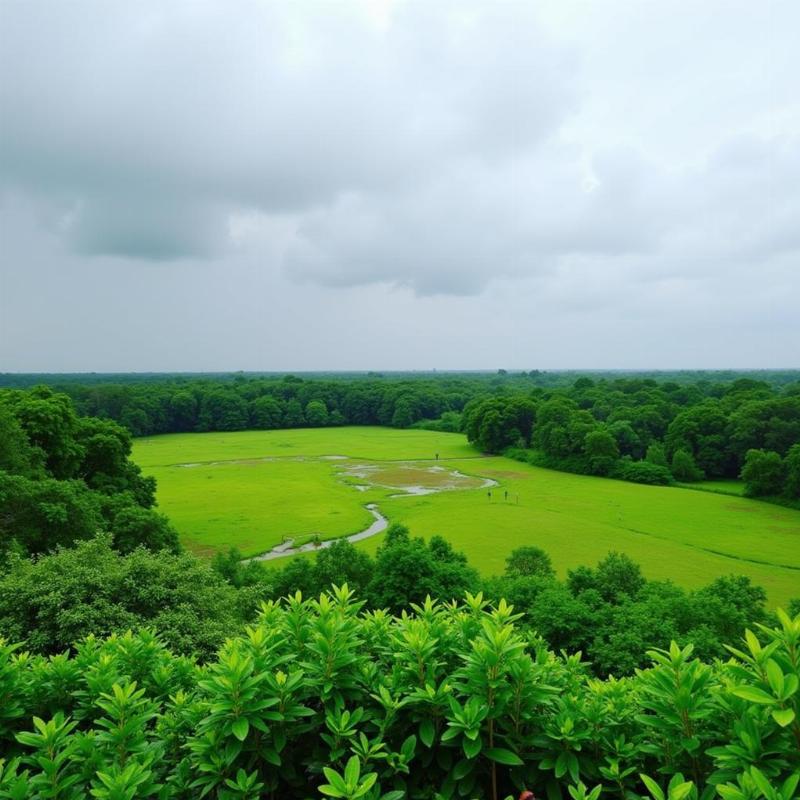Dudhwa National Park, a haven for wildlife enthusiasts, offers a unique experience depending on when you visit. Understanding the best time to visit Dudhwa National Park is crucial for maximizing your chances of spotting diverse fauna and enjoying the park’s varied landscapes. This guide will delve into the seasonal nuances, helping you plan the perfect trip to this incredible Indian national park.
Dudhwa National Park: A Seasonal Guide
Dudhwa’s climate significantly influences the park’s accessibility and the behavior of its inhabitants. Each season paints a different picture, offering distinct advantages and disadvantages for visitors.
Summer (April-June): Heat and Humidity
Summer in Dudhwa is characterized by soaring temperatures, often exceeding 40°C (104°F). While the heat can be challenging, it also drives animals to water sources, increasing your chances of spotting them. However, the lush vegetation can make wildlife viewing slightly more difficult.
- Pros: Higher chances of animal sightings at waterholes.
- Cons: Intense heat can be uncomfortable. Lush vegetation might obstruct views.
Monsoon (July-September): Lush Greenery and Limited Access
The monsoon season brings heavy rainfall, transforming Dudhwa into a vibrant green paradise. While the scenery is breathtaking, many areas become inaccessible due to flooding. Some zones might remain open, but it’s crucial to check with park authorities before planning your visit.
- Pros: Stunning landscapes and lush greenery.
- Cons: Limited accessibility due to flooding. Reduced wildlife sightings.
 Dudhwa National Park Monsoon Season: Lush Green Landscape
Dudhwa National Park Monsoon Season: Lush Green Landscape
Post-Monsoon (October-November): Pleasant Weather and Wildlife Abundance
The post-monsoon period is arguably the best time to visit Dudhwa National Park. The weather is pleasant, with moderate temperatures and clear skies. The vegetation is still relatively thick, providing excellent cover for animals, but not so dense as to obstruct viewing. This period also marks the beginning of the migratory bird season, adding another dimension to the park’s biodiversity.
- Pros: Ideal weather conditions. Increased wildlife activity. Migratory birds arrive.
- Cons: Mosquitoes can be a nuisance.
Winter (December-March): Clear Skies and Abundant Wildlife
Winter in Dudhwa is characterized by cool temperatures and clear skies, making it another excellent time for wildlife viewing. Animals are more active during the day, seeking warmth in the sun. The dry vegetation also improves visibility, making it easier to spot elusive creatures like tigers and leopards.
- Pros: Excellent visibility for wildlife spotting. Pleasant weather for exploration.
- Cons: Early morning game drives can be chilly.
When is the Ideal Time for You?
Expert Insight: Dr. Anya Sharma, a wildlife biologist with extensive experience in Dudhwa, suggests, “The best time to visit Dudhwa really depends on your priorities. If you’re keen on birdwatching, the post-monsoon and winter months are ideal. For optimal tiger sightings, consider visiting during the summer or winter.”
So, when should you visit? The best time to visit Dudhwa National Park depends on your preferences and tolerance for weather conditions. The post-monsoon (October-November) and winter (December-March) months offer the most comfortable weather and excellent wildlife viewing opportunities. Summer (April-June) can be rewarding for spotting animals near water sources, but the heat can be intense. The monsoon season (July-September) is best avoided due to limited accessibility.
Conclusion
Planning your trip around the best time to visit Dudhwa National Park is essential for a fulfilling wildlife experience. Whether you choose the vibrant post-monsoon period or the crisp winter months, Dudhwa’s diverse flora and fauna are sure to leave a lasting impression.
FAQ
- What is the entry fee for Dudhwa National Park? The entry fee varies depending on nationality and mode of transport. It’s best to check the official website for the latest information.
- Are there accommodations available inside Dudhwa National Park? Yes, there are forest rest houses and lodges available within the park. Booking in advance is recommended.
- What kind of wildlife can I expect to see in Dudhwa National Park? Dudhwa is home to a wide range of wildlife, including tigers, leopards, elephants, rhinos, deer, and numerous bird species.
- What is the best way to explore Dudhwa National Park? Jeep safaris are the most common and effective way to explore the park.
- Are there any restrictions on visiting Dudhwa National Park? Yes, certain areas might be restricted during the monsoon season due to flooding. It’s essential to follow park regulations and guidelines.
- Is Dudhwa National Park suitable for families with children? Yes, Dudhwa can be a great experience for families with children. However, it’s important to take necessary precautions and follow safety guidelines.
- What is the nearest airport to Dudhwa National Park? The nearest airport is Chaudhary Charan Singh International Airport in Lucknow.
PlaTovi, your trusted travel partner, can help you plan your perfect trip to Dudhwa National Park. We offer a range of services including customized tour packages, hotel bookings, and transportation arrangements. Contact us at [email protected] or +91 22-2517-3581 to learn more. Let PlaTovi create an unforgettable wildlife adventure for you!